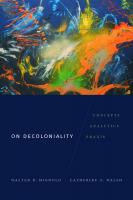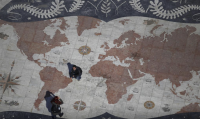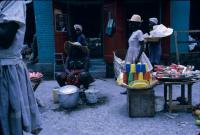 The conflict raging in Ukraine between Russian and Ukrainian Slavs, the latter with the support of a tribal coalition of nations across sub-Scandinavian Europe, has exposed much more than the fragility of peace on the disease-ravaged subcontinent. It has also revealed a mean streak of racist exceptionalism with which many Europeans, and people of European heritage, tend to regard themselves.
It has been impossible to miss the shock among Caucasian journalists covering the war, sparked by Russia’s invasion under the pretext of supporting ethnic allies in the eastern tribal enclaves of Donetsk and Luhansk, which it has recognised as independent states, at the idea that this could happen in Europe.
The conflict raging in Ukraine between Russian and Ukrainian Slavs, the latter with the support of a tribal coalition of nations across sub-Scandinavian Europe, has exposed much more than the fragility of peace on the disease-ravaged subcontinent. It has also revealed a mean streak of racist exceptionalism with which many Europeans, and people of European heritage, tend to regard themselves.
It has been impossible to miss the shock among Caucasian journalists covering the war, sparked by Russia’s invasion under the pretext of supporting ethnic allies in the eastern tribal enclaves of Donetsk and Luhansk, which it has recognised as independent states, at the idea that this could happen in Europe.
Games Without Borders
04.03.2022 | by Patrick Gathara
 There is no Afro-Brazilian art student I have met who is not enthusiastic about Mbembe’s thoughts. This is definitely a good sign; an expression of the growing debate about racism, hidden for too long in Brazil. The current political situation does not leave space anymore for denial. It is also a reflection of two factors: firstly, the complexity of the relation between decoloniality and globalisation in the South; and secondly, the relation between publishing policies and the circulation of critical thought.
There is no Afro-Brazilian art student I have met who is not enthusiastic about Mbembe’s thoughts. This is definitely a good sign; an expression of the growing debate about racism, hidden for too long in Brazil. The current political situation does not leave space anymore for denial. It is also a reflection of two factors: firstly, the complexity of the relation between decoloniality and globalisation in the South; and secondly, the relation between publishing policies and the circulation of critical thought.
To read
07.09.2021 | by Laura Burocco
 The memorial - rows of palm trees painted in black - was designed by Angolan artist Kiluanji Kia Henda and funded by Lisbon council. It will stand in the centre of the city.
From the 15th to the 19th century, Portuguese vessels carried close to 6 million enslaved Africans across the Atlantic, more than any other nation, but up to now Portugal has rarely commented on its past actions and little is taught about its role in slavery in schools.
Rather, Portugal’s colonial era, which saw countries including Angola, Mozambique, Brazil, Cape Verde, East Timor as well as parts of India subjected to Portuguese rule, is often perceived as a source of pride.
The memorial - rows of palm trees painted in black - was designed by Angolan artist Kiluanji Kia Henda and funded by Lisbon council. It will stand in the centre of the city.
From the 15th to the 19th century, Portuguese vessels carried close to 6 million enslaved Africans across the Atlantic, more than any other nation, but up to now Portugal has rarely commented on its past actions and little is taught about its role in slavery in schools.
Rather, Portugal’s colonial era, which saw countries including Angola, Mozambique, Brazil, Cape Verde, East Timor as well as parts of India subjected to Portuguese rule, is often perceived as a source of pride.
Games Without Borders
24.03.2021 | by Catarina Demony and Victoria Waldersee
 During the colonial era, the French colonists did not want to share anything with the slaves, including food. As the population grew and grew, the colonizers decided to give the slaves pieces of land called portion de vive which were to be used as a way for them to feed their own families. The producers on this land were so successful that they began to trade what they were growing.
During the colonial era, the French colonists did not want to share anything with the slaves, including food. As the population grew and grew, the colonizers decided to give the slaves pieces of land called portion de vive which were to be used as a way for them to feed their own families. The producers on this land were so successful that they began to trade what they were growing.
Face to face
18.03.2021 | by The Public Archive
 The oppressive policies and structural inequities that underlie the conditions of poor and working class people’s lives here and abroad date from the first invasion of native territories, and the last few decades have exacerbated these conditions. What our older films reveal is the similarity of conditions now with what existed 50 years ago.
The oppressive policies and structural inequities that underlie the conditions of poor and working class people’s lives here and abroad date from the first invasion of native territories, and the last few decades have exacerbated these conditions. What our older films reveal is the similarity of conditions now with what existed 50 years ago.
Face to face
03.03.2021 | by Keelyn Bradley
 The conflict raging in Ukraine between Russian and Ukrainian Slavs, the latter with the support of a tribal coalition of nations across sub-Scandinavian Europe, has exposed much more than the fragility of peace on the disease-ravaged subcontinent. It has also revealed a mean streak of racist exceptionalism with which many Europeans, and people of European heritage, tend to regard themselves.
It has been impossible to miss the shock among Caucasian journalists covering the war, sparked by Russia’s invasion under the pretext of supporting ethnic allies in the eastern tribal enclaves of Donetsk and Luhansk, which it has recognised as independent states, at the idea that this could happen in Europe.
The conflict raging in Ukraine between Russian and Ukrainian Slavs, the latter with the support of a tribal coalition of nations across sub-Scandinavian Europe, has exposed much more than the fragility of peace on the disease-ravaged subcontinent. It has also revealed a mean streak of racist exceptionalism with which many Europeans, and people of European heritage, tend to regard themselves.
It has been impossible to miss the shock among Caucasian journalists covering the war, sparked by Russia’s invasion under the pretext of supporting ethnic allies in the eastern tribal enclaves of Donetsk and Luhansk, which it has recognised as independent states, at the idea that this could happen in Europe.  There is no Afro-Brazilian art student I have met who is not enthusiastic about Mbembe’s thoughts. This is definitely a good sign; an expression of the growing debate about racism, hidden for too long in Brazil. The current political situation does not leave space anymore for denial. It is also a reflection of two factors: firstly, the complexity of the relation between decoloniality and globalisation in the South; and secondly, the relation between publishing policies and the circulation of critical thought.
There is no Afro-Brazilian art student I have met who is not enthusiastic about Mbembe’s thoughts. This is definitely a good sign; an expression of the growing debate about racism, hidden for too long in Brazil. The current political situation does not leave space anymore for denial. It is also a reflection of two factors: firstly, the complexity of the relation between decoloniality and globalisation in the South; and secondly, the relation between publishing policies and the circulation of critical thought.  The memorial - rows of palm trees painted in black - was designed by Angolan artist Kiluanji Kia Henda and funded by Lisbon council. It will stand in the centre of the city.
From the 15th to the 19th century, Portuguese vessels carried close to 6 million enslaved Africans across the Atlantic, more than any other nation, but up to now Portugal has rarely commented on its past actions and little is taught about its role in slavery in schools.
Rather, Portugal’s colonial era, which saw countries including Angola, Mozambique, Brazil, Cape Verde, East Timor as well as parts of India subjected to Portuguese rule, is often perceived as a source of pride.
The memorial - rows of palm trees painted in black - was designed by Angolan artist Kiluanji Kia Henda and funded by Lisbon council. It will stand in the centre of the city.
From the 15th to the 19th century, Portuguese vessels carried close to 6 million enslaved Africans across the Atlantic, more than any other nation, but up to now Portugal has rarely commented on its past actions and little is taught about its role in slavery in schools.
Rather, Portugal’s colonial era, which saw countries including Angola, Mozambique, Brazil, Cape Verde, East Timor as well as parts of India subjected to Portuguese rule, is often perceived as a source of pride.  During the colonial era, the French colonists did not want to share anything with the slaves, including food. As the population grew and grew, the colonizers decided to give the slaves pieces of land called portion de vive which were to be used as a way for them to feed their own families. The producers on this land were so successful that they began to trade what they were growing.
During the colonial era, the French colonists did not want to share anything with the slaves, including food. As the population grew and grew, the colonizers decided to give the slaves pieces of land called portion de vive which were to be used as a way for them to feed their own families. The producers on this land were so successful that they began to trade what they were growing.  The oppressive policies and structural inequities that underlie the conditions of poor and working class people’s lives here and abroad date from the first invasion of native territories, and the last few decades have exacerbated these conditions. What our older films reveal is the similarity of conditions now with what existed 50 years ago.
The oppressive policies and structural inequities that underlie the conditions of poor and working class people’s lives here and abroad date from the first invasion of native territories, and the last few decades have exacerbated these conditions. What our older films reveal is the similarity of conditions now with what existed 50 years ago. 